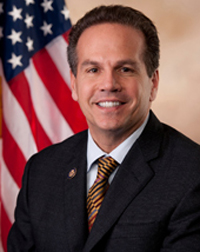By Donald H. Harrison


SAN DIEGO — County Supervisor Nathan Fletcher plans to run in 2024 for the seat of state Senate President pro tempore Toni Atkins, D-San Diego, the year she will be ineligible to run again because of term limits. Fletcher will be in the middle of his second term as a county supervisor at that time, so, depending on the outcome of the state Senate election, we may face a special election for his seat.
In cases of a vacancy on the Board of Supervisors, the remaining four supervisors may vote to fill the seat by appointment. If they cannot agree, or if they take no action, a special election automatically will be scheduled. Fletcher’s colleagues are two Democrats (Nora Vargas and Terra Lawson-Remer) and two Republicans (Joel Anderson and Jim Desmond.) If those colleagues were to remain on the Board after Fletcher’s election, it’s possible they might find a candidate they all could support for appointment, but it is also possible that a special election would have to be scheduled.
If Fletcher does not win the state Senate seat, then he would continue as a supervisor through the end of his term in 2026.
Meanwhile, the first person to announce plans to run for Fletcher’s seat, in the expectation that he will win the state Senate race, is Janessa Goldbeck. She ran unsuccessfully in 2020 for the congressional seat from which Rep. Susan Davis, D-San Diego, retired and which was won by Rep. Sara Jacobs, who now is in her second term.
In a news release, Goldbeck described herself as “an advocate for veterans and a leader in San Diego’s LGBTQ community.” She included a list of prominent past and present Democratic officeholders who have already endorsed her, including Congressmen Mike Levin, Juan Vargas, and Scott Peters, and former Congresswoman Davis; State Senators Toni Akins, Catherine Blakespear, Steve Padilla, and former State Sen. Christine Kehoe; Assembly members Tasha Boemer-Horvath and Chris Ward; and San Diego City Councilmember Marni von Wilpert.

Conspicuous by her absence was Jewish Congresswoman Jacobs, whom Goldbeck previously had opposed. During that campaign, Goldbeck criticized Jacobs for taking money from her grandparents Joan and Irwin Jacobs, the latter being the billionaire co-founder of Qualcomm. Goldbeck suggested that taking Jacobs’ family money meant Jacobs would be beholden to corporate interests.
In her news release, Goldbeck commented that “never in the 132-year history of the San Diego County Board of Supervisors has a woman been elected to represent our community—the 4th District. Never. All my life I’ve taken on tough missions, from serving in the Marines to fighting against the ban on women serving in top combat roles to working as a victims’ advocate for survivors of assault.”
This is a bit of forgivable hyperbole. It’s not as if the Board of Supervisors is a male-only bastion. Far from it. Women have been elected to the Board in other districts. The 1st District currently is represented by Nora Vargas, whose colleagues have elected her as the board’s chairperson. The 2nd District was represented by Lucille Moore from 1977 through 1980, and by Dianne Jacob from 1993 through 2020. Supervisors from the 3rd District included Susan Golding from 1985 through 1992; Pam Slater-Price from 1993 through 2012; and Kristin Gaspar from 2017 through 2020. Neither the 4th nor the 5th Supervisorial District has yet to elect a woman, but I know of no one in either district who objects on principle to having a woman represent them.
As for the males who represented the 4th District prior to Fletcher, they included Ron Roberts who served from 1995 to 2018 and his predecessor, Leon Williams, the first African-American to serve on the board, from 1983 through 1994.
The County Registrar of Voters office reports that since 2017, there have been eight special elections within the County of San Diego, with the size of the electorates ranging from 4,321 registered voters in a Rancho Santa Fe School District contest in 2018 to 302,703 registered voters in the 79th Assembly District contest in 2021. The size of the electorate is one factor in calculating the cost of a special election because sample ballots are sent to each registered voter. Some of the other factors include the number of candidates on the ballot, the number of pages in the voter information pamphlet, and the cost of postage.
Last year, in the 80th Assembly District’s special election, there were 246,203 registered voters. That contest cost the taxpayers $2.3 million, according to the County Registrar of Voters. The current registration in Fletcher’s 4th Supervisorial District is 387,964 voters.
*
Rhode Island

U.S. Rep. David Cicilline, D-Rhode Island, announced on Tuesday, Feb. 22, that he will leave Congress on June 1 to accept a position as president and executive director of the Rhode Island Foundation, a non-profit with $1.3 billion in assets. The Foundation focuses on improving the lives of Rhode Island citizens. He will succeed Neil D. Steinberg, who will remain in that position until Cicilline begins his tenure.
“It was a high priority for us, from the beginning of this search process, to attract a diverse pool of candidates,” commented the Foundation’s board chair Alan Kurose. “Congressman Cicilline’s career-long fight for equity and equality at the local, national, and international level, and his deep relationships within Rhode Island’s communities of color are two of the many factors that led us to this decision.”
Having served last year as the chair of the Middle East subcommittee of the House Foreign Affairs Committee, Cicilline was supported for that position both by the American-Israel Public Affairs Committee and J Street, two organizations that often clash on what U.S. policy should be towards the Jewish State. Cicilline is the son of a Jewish mother and an Italian Catholic father. He follows his mother’s religion. Before his election to Congress, Cicilline, who is gay, served as the mayor of Providence, the capital and largest city in Rhode Island.
The Jewish Telegraph Agency has noted that Cicilline, 61, now in his seventh Congressional term, has criticized the United Nations for continually singling out Israel for censure. He has criticized members of the new ruling coalition in Israel for anti-LGBTQ prejudice. As a member of the House Judiciary Committee, he served as one of the managers for the House of Representatives as it brought impeachment charges against then-President Donald Trump.
Although Cicilline has had a fulfilling and productive life in Congress, and looks forward to more community service with the Rhode Island Foundation, I question whether his early retirement is fair to the residents of his 1st Congressional District. His resignation will trigger a special election with costs that could have been avoided if he had remained in office for the duration of the two-year term. If someone who currently hold another office wins that special election, it could trigger yet another special election to fill that person’s spot. The losers are the taxpayers.
We can’t force someone to remain in office if they want to resign, but it might be possible to ameliorate the cost to taxpayers for such political ladder climbing. Here are two possibilities. First, make vacancies in the House of Representatives, like those in the U.S. Senate, fillable by the state’s governor. Or, second, adopt a law that the candidate who was the runner-up in the previous election would automatically assume the vacant seat.
*
Donald H. Harrison is editor emeritus of San Diego Jewish World. He may be contacted via donald.harrison@sdjewishworld.com